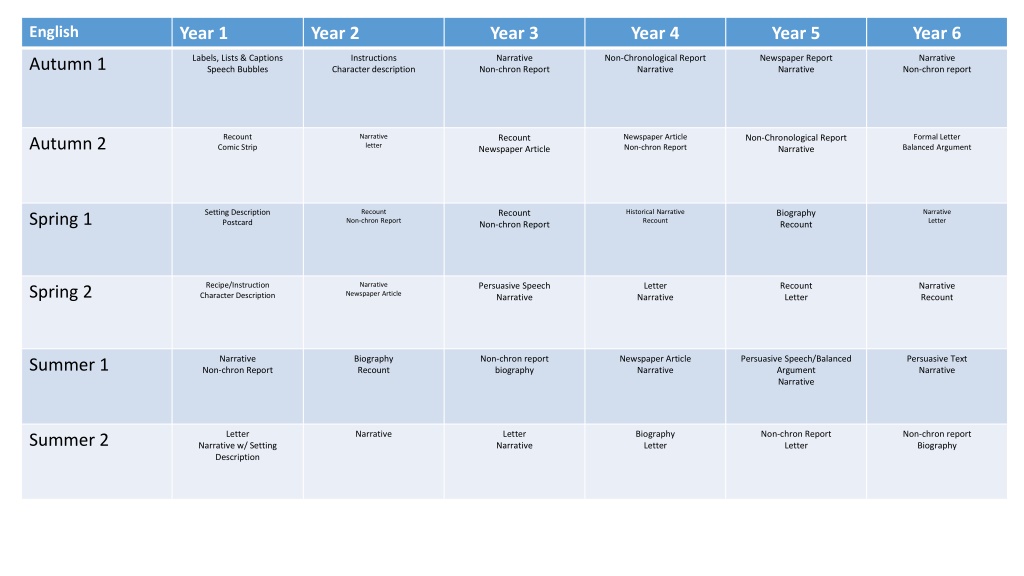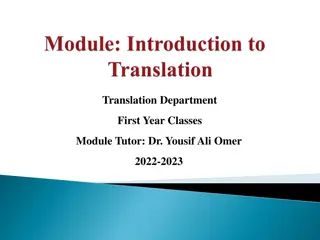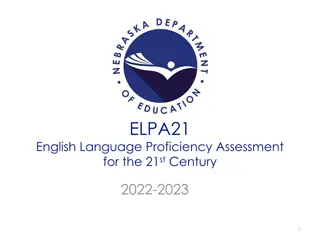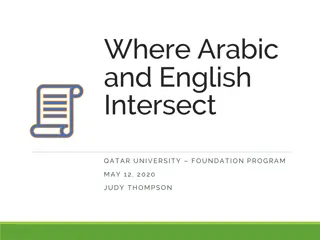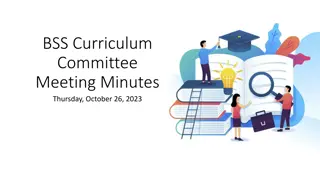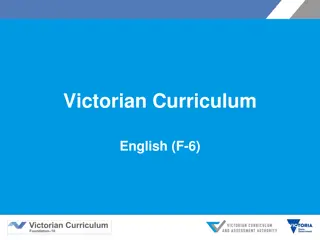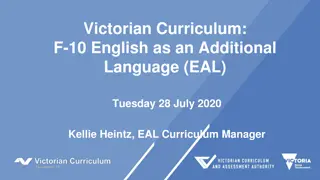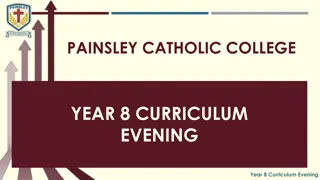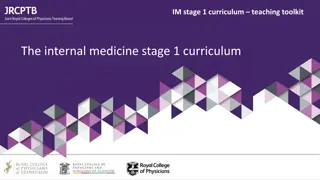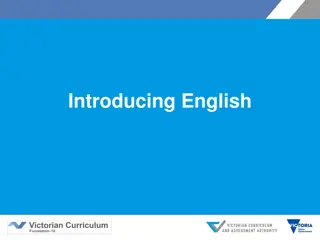English Language Curriculum Overview
The English language curriculum covers a wide range of skills and knowledge from phonics to reading comprehension. Students are taught to decode words, blend sounds, read accurately, understand word meanings, and develop handwriting skills. The curriculum aims to foster a love for reading, build vocabulary, and enhance comprehension through various literary genres and activities.
Download Presentation

Please find below an Image/Link to download the presentation.
The content on the website is provided AS IS for your information and personal use only. It may not be sold, licensed, or shared on other websites without obtaining consent from the author.If you encounter any issues during the download, it is possible that the publisher has removed the file from their server.
You are allowed to download the files provided on this website for personal or commercial use, subject to the condition that they are used lawfully. All files are the property of their respective owners.
The content on the website is provided AS IS for your information and personal use only. It may not be sold, licensed, or shared on other websites without obtaining consent from the author.
E N D
Presentation Transcript
English Year 1 Year 2 Year 3 Year 4 Year 5 Year 6 Labels, Lists & Captions Speech Bubbles Instructions Character description Narrative Non-chron Report Non-Chronological Report Narrative Newspaper Report Narrative Narrative Non-chron report Autumn 1 Narrative letter Recount Comic Strip Newspaper Article Non-chron Report Formal Letter Balanced Argument Recount Non-Chronological Report Narrative Autumn 2 Newspaper Article Recount Historical Narrative Recount Narrative Letter Setting Description Postcard Recount Biography Recount Spring 1 Non-chron Report Non-chron Report Narrative Newspaper Article Recipe/Instruction Character Description Persuasive Speech Narrative Letter Narrative Recount Letter Narrative Recount Spring 2 Narrative Non-chron Report Biography Recount Non-chron report biography Newspaper Article Narrative Persuasive Speech/Balanced Argument Narrative Persuasive Text Narrative Summer 1 Letter Narrative Letter Narrative Biography Letter Non-chron Report Letter Non-chron report Biography Summer 2 Narrative w/ Setting Description
Year One KEY KNOWLEDGE AND SKILLS Pupils should be taught to: * apply phonic knowledge and skills as the route to decode words *respond speedily with the correct sound to graphemes (letters or groups of letters) for all 40+ phonemes, including, where applicable, alternative sounds for graphemes *read accurately by blending sounds in unfamiliar words containing GPCs that have been taught *read common exception words, noting unusual correspondences between spelling and sound and where these occur in the word *read words containing taught GPCs and s, es, ing, ed, er and est endings read other words of more than one syllable that contain taught GPCs *read words with contractions [for example, I m, I ll, we ll], and understand that the apostrophe represents the omitted letter(s) *read aloud accurately books that are consistent with their developing phonic knowledge and that do not require them to use other strategies to work out words *re-read these books to build up their fluency and confidence in word reading. Reading Word Level Pupils should be taught to: *develop pleasure in reading, motivation to read, vocabulary and understanding by: - listening to and discussing a wide range of poems, stories and non-fiction at a level beyond that at which they can read independently - -being encouraged to link what they read or hear read to their own experiences - becoming very familiar with key stories, fairy stories and traditional tales, retelling them and considering their particular characteristics -recognisingand joining in with predictable phrases - learning to appreciate rhymes and poems, and to recite some by heart -discussing word meanings, linking new meanings to those already known *understand both the books they can already read accurately and fluently and those they listen to by: -drawing on what they already know or on background information and vocabulary provided by the teacher correcting inaccurate reading -discussing the significance of the title and events -making inferences on the basis of what is being said and done what has been read so far *participate in discussion about what is read to them, taking turns and listening to what others say *explain clearly their understanding of what is read to them. Reading Comprehension -checking that the text makes sense to them as they read and -predicting what might happen on the basis of Pupils should be taught to: sit correctly at a table, holding a pencil comfortably and correctly * form capital letters *form digits 0-9 these. Handwriting *begin to form lower-case letters in the correct direction, starting and finishing in the right place *understand which letters belong to which handwriting families (i.e. letters that are formed in similar ways) and to practise The sounds /f/, /l/, /s/, /z/ and /k/ spelt ff, ll, ss, zz and ck The /v/ sound at the end of words Adding s and es to words (plural of nouns and the third person singular of verbs) Words ending y (/i:/ or / /) Adding the endings ing, ed and er to verbs where no change is needed to the root word Adding er and est to adjectives where no change is needed to the root word New consonant spellings ph and wh Using k for the /k/sound Adding the prefix un Common exception words Compound words The / / sound spelt n before k (eg bank, think) Division of words into syllables -tch Spelling
Year One KEY KNOWLEDGE AND SKILLS AUTUMN AUTUMN SPRING SPRING SUMMER SUMMER Animals and Humans Bog Baby Jeanne Willis Old and New Toys The Toy Maker - Robert Dinsdale Exploring Hot and Cold Places Lost and Found -Oliver Jeffers Plants Materials Beegu Explorers (N Armstrong and C Columbus) NEED A NEW BOOK FOR THIS FOCUS Jack and the Baked Beanstalk -Colin Stimpson Labels including Captions Speech Bubbles Recount Comic Strip Setting Description Postcard Recipe/Instructions Character Description Non-chron Report Narrative Letter Narrative w/ Setting Description GENRES Write sentences by: -saying out loud what they are going to write about -composing a sentence orally before writing it -sequencing sentences to form short narratives -re-reading what they have written to check that it makes sense *discuss what they have written with the teacher or other pupils *read aloud their writing clearly enough to be heard by their peers and the teacher. Composition Finger spaces between words Using and Capital letters full stops Question marks Exclamation marks Capital letters for names and days of the week Personal pronoun: I Recognizing and using verbs Using the prefix un Regular plural nouns Regular past tense verbs Combining words to make sentences Sequencing sentences to make a narrative SPAG
Year Two KEY KNOWLEDGE AND SKILLS Pupils should be taught to: continue to apply phonic knowledge and skills as the route to decode words until automatic decoding has become embedded and reading is fluent read accurately by blending the sounds in words that contain the graphemes taught so far, especially recognising alternative sounds for graphemes read accurately words of two or more syllables that contain the same graphemes as above read words containing common suffixes read further common exception words, noting unusual correspondences between spelling and sound and where these occur in the word read most words quickly and accurately, without overt sounding and blending, when they have been frequently encountered read aloud books closely matched to their improving phonic knowledge, sounding out unfamiliar words accurately, automatically and without undue hesitation re-read these books to build up their fluency and confidence in word reading. Reading Word Level Pupils should be taught to: *develop pleasure in reading, motivation to read, vocabulary and understanding by: - listening to, discussing and expressing views about a wide range of contemporary and classic poetry, stories and non-fiction at a level beyond that at which they can read independently - discussing the sequence of events in books and how items of information are related becoming increasingly familiar with and retelling a wider range of stories, fairy stories and traditional tales - being introduced to non-fiction books that are structured in different ways -recognising simple recurring literary language in stories and poetry - discussing and clarifying the meanings of words, linking new meanings to known vocabulary - discussing their favourite words and phrases -continuing to build up a repertoire of poems learnt by heart, appreciating these and reciting some, with appropriate intonation to make the meaning clear *understand both the books that they can already read accurately and fluently and those that they listen to by: - drawing on what they already know or on background information and vocabulary provided by the teacher inaccurate reading - making inferences on the basis of what is being said and done -answering and asking questions predicting what might happen on the basis of what has been read so far *participate in discussion about books, poems and other works that are read to them and those that they can read for themselves, taking turns and listening to what others say *explain and discuss their understanding of books, poems and other material, both those that they listen to and those that they read for themselves. Reading Comprehension -checking that the text makes sense to them as they read and correcting Pupils should be taught to: form lower-case letters of the correct size relative to one another start using some of the diagonal and horizontal strokes needed to join letters and understand which letters, when adjacent to one another, are best left unjoined write capital letters and digits of the correct size, orientation and relationship to one another and to lower case letters use spacing between words that reflects the size of the letters. Handwriting The /d / sound spelt as ge and dge at the end of words, and sometimes spelt as g elsewhere in words before e, i and y The /l/ or / l/ sound spelt le at the end of words The /s/ sound spelt c before e, i and y The /n/ sound spelt kn and (less often) gn at the beginning of words The /r/ sound spelt wr at the beginning of words The /l/ or / l/ sound spelt el at the end of words The /l/ or / l/ sound spelt al at the end of words Words ending il Adding es to nouns and verbs ending in y Adding ed, ing, er and est to a root word ending in y with a consonant before it The / / sound spelt o Adding the endings ing, ed, er, est and y to words ending in e with a consonant before it The / :/ sound spelt a before l and ll Adding ing, ed, er, est and y to words of one syllable ending in a single consonant letter after a single vowel letter The /i:/ sound spelt ey The / / sound spelt a after w and qu The / :/ sound spelt or after w The / :/ sound spelt ar after w Contractions Words ending in -tion The / / sound spelt s The suffixes ment, ness, ful , less and ly Homophones Common exception words Spelling The /a / sound spelt y at the end of words
Year Two KEY KNOWLEDGE AND SKILLS AUTUMN AUTUMN SPRING SPRING SUMMER SUMMER Materials Victorians Major Glad, Major Dizzie -Jan Oke Kenya Plants/Great Fire of London NEED TO FIND A BOOK TO LINK WITH THIS Florence Nightingale The Life of Florence Nightingale -Liz Gogerly Habitats FOCUS Traction Man -Mini Grey Lila and the Secret of Rain -David Conway Wild -Emily Hughes Instructions Character Description Letter Narrative Recount Non-chron Report Narrative Newspaper Article Biography Recount Narrative GENRES Pupils should be taught to: *develop positive attitudes towards and stamina for writing by: -writing narratives about personal experiences and those of others (real and fictional) -writing about real events -writing poetry *consider what they are going to write before beginning by: -planning or saying out loud what they are going to write about -writing down ideas and/or key words, including new vocabulary -encapsulating what they want to say, sentence by sentence *make simple additions, revisions and corrections to their own writing by: -evaluating their writing with the teacher and other pupils -re-reading to check that their writing makes sense and that verbs to indicate time are used correctly and consistently, including verbs in the continuous form -proof-reading to check for errors in spelling, grammar and punctuation [for example, ends of sentences punctuated correctly] *read aloud what they have written with appropriate intonation to make the meaning clear. Composition -writing for different purposes Full stops, capital letters Capital letters proper nouns Question marks Exclamation marks commands Regualr plural nouns Commas in lists Apostrophes contraction Prefix-un Sentence forms Regular past tense verbs Past tense Suffix-ful Adjectives (expanded noun phrases) Apostrophes for possession Progressive tense Auxiliary verbs Irregular past tense verbs Adverbs Using and and but Using because Suffix-less Using when , if and that Using or Suffixes-er and est Irregular plural nouns Suffix-er Word classes Compound words Irregular adjectives Vocabulary, Grammar, Punctuation
KEY KNOWLEDGE AND SKILLS Year Three Pupils should be taught to: *apply their growing knowledge of root words, prefixes and suffixes (etymology and morphology) as listed in English Appendix 1, both to read aloud and to understand the meaning of new words they meet *read further exception words, noting the unusual correspondences between spelling and sound, and where these occur in the word. Reading Word Level Pupils should be taught to: *develop positive attitudes to reading and understanding of what they read by: - listening to and discussing a wide range of fiction, poetry, plays, non-fiction and reference books or textbooks reading books that are structured in different ways and reading for a range of purposes - using dictionaries to check the meaning of words that they have read - increasing their familiarity with a wide range of books, including fairy stories, myths and legends, and retelling some of these orally - identifying themes and conventions in a wide range of books - preparing poems and play scripts to read aloud and to perform, showing understanding through intonation, tone, volume and action - discussing words and phrases that capture the reader s interest and imagination - recognising some different forms of poetry [for example, free verse, narrative poetry] *understand what they read, in books they can read independently, by: checking that the text makes sense to them, discussing their understanding and explaining the meaning of words in context asking questions to improve their understanding of a text drawing inferences such as inferring characters feelings, thoughts and motives from their actions, and justifying inferences with evidence predicting what might happen from details stated and implied identifying main ideas drawn from more than one paragraph and summarising these identifying how language, structure, and presentation contribute to meaning *retrieve and record information from non-fiction *participate in discussion about both books that are read to them and those they can read for themselves, taking turns and listening to what others say. Reading Comprehension Pupils should be taught to: use the diagonal and horizontal strokes that are needed to join letters and understand which letters, when adjacent to one another, are best left unjoined increase the legibility, consistency and quality of their handwriting [for example, by ensuring that the downstrokes of letters are parallel and equidistant; that lines of writing are spaced sufficiently so that the ascenders and descenders of letters do not touch]. Handwriting Adding suffixes beginning with vowel letters to words of more than one syllable The / / sound spelt ou The / / sound spelt y elsewhere than at the end of words The suffix ation Words with endings sounding like / / or /t / Endings which sound like / n/ Endings which sound like / n/, spelt tion, sion, ssion, cian Words with the /k/ sound spelt ch (Greek in origin) Words with the / / sound spelt ch (mostly French in origin) Words ending with the /g/ sound spelt gue and the /k/ sound spelt que (French in origin) Words with the /s/ sound spelt sc (Latin in origin) Words with the /e / sound spelt ei, eigh, or ey Possessive apostrophe with plural words Homophones and near homophones And to learn all the words from the Year 3 and 4 Statutory Spelling List More prefixes Spelling The suffix ly The suffix-ous
Year Three KEY KNOWLEDGE AND SKILLS AUTUMN AUTUMN SPRING SPRING SUMMER SUMMER Rocks Natural Disasters Escape From Pompeii -Christina Balit Stone Age/Iron Age Stone Age Boy - Satoshi Kitamora Plants Romans Light FOCUS The Pebble in My Pocket -Meredith Hooper The Boy Who Grew Dragons -Andy Shephard The Roman Diary - Richard Platt Orian and the Dark - Emma Yarlett Narrative Non-chron Report Recount Newspaper Article Biography Non-chron Report Persuasive Speech Narrative Non-chron report Recount Letter Narrative GENRES Pupils should be taught to: plan their writing by: - discussing writing similar to that which they are planning to write in order to understand and learn from its structure, vocabulary and grammar - discussing and recording ideas draft and write by: - composing and rehearsing sentences orally (including dialogue), progressively building a varied and rich vocabulary and an increasing range of sentence structures (English Appendix 2) - organisingparagraphs around a theme - in narratives, creating settings, characters and plot - in non-narrative material, using simple organisationaldevices [for example, headings and sub-headings] evaluate and edit by: - assessing the effectiveness of their own and others writing and suggesting improvements -proposing changes to grammar and vocabulary to improve consistency, including the accurate use of pronouns in sentences proof-read for spelling and punctuation errors read aloud their own writing, to a group or the whole class, using appropriate intonation and controlling the tone and volume so that the meaning is clear. Composition Full stops, capital letters Conjunctions Question marks Adjectives Pronouns Conjunctions to express time Past tense Prepositions Speech marks Verbs Adjectives Plurals Adverbs Alternative verbs Prepositions Parts of a sentence Irregular past tense Conjunctions Apostrophe for contraction Direct speech Full stops, question and exclamation marks Commas in lists Adverbs to begin sentences Prefixes Apostrophe for possession Words for possession Present perfect tense Subordinate clause Alternatives for said Irregular adjectives Vocabulary, Grammar, Punctutation
Pupils should be taught to: *apply their growing knowledge of root words, prefixes and suffixes (etymology and morphology) as listed in English Appendix 1, both to read aloud and to understand the meaning of new words they meet *read further exception words, noting the unusual correspondences between spelling and sound, and where these occur in the word. Reading Word Level Pupils should be taught to: *develop positive attitudes to reading and understanding of what they read by: - listening to and discussing a wide range of fiction, poetry, plays, non-fiction and reference books or textbooks reading books that are structured in different ways and reading for a range of purposes - using dictionaries to check the meaning of words that they have read - increasing their familiarity with a wide range of books, including fairy stories, myths and legends, and retelling some of these orally - identifying themes and conventions in a wide range of books - preparing poems and play scripts to read aloud and to perform, showing understanding through intonation, tone, volume and action - discussing words and phrases that capture the reader s interest and imagination - recognising some different forms of poetry [for example, free verse, narrative poetry] *understand what they read, in books they can read independently, by: checking that the text makes sense to them, discussing their understanding and explaining the meaning of words in context asking questions to improve their understanding of a text drawing inferences such as inferring characters feelings, thoughts and motives from their actions, and justifying inferences with evidence predicting what might happen from details stated and implied identifying main ideas drawn from more than one paragraph and summarising these identifying how language, structure, and presentation contribute to meaning *retrieve and record information from non-fiction *participate in discussion about both books that are read to them and those they can read for themselves, taking turns and listening to what others say. Reading Comprehension Pupils should be taught to: use the diagonal and horizontal strokes that are needed to join letters and understand which letters, when adjacent to one another, are best left unjoined increase the legibility, consistency and quality of their handwriting [for example, by ensuring that the downstrokes of letters are parallel and equidistant; that lines of writing are spaced sufficiently so that the ascenders and descenders of letters do not touch]. Handwriting Adding suffixes beginning with vowel letters to words of more than one syllable The / / sound spelt ou The / / sound spelt y elsewhere than at the end of words The suffix ation Words with endings sounding like / / or /t / Endings which sound like / n/ Endings which sound like / n/, spelt tion, sion, ssion, cian Words with the /k/ sound spelt ch (Greek in origin) Words with the / / sound spelt ch (mostly French in origin) Words ending with the /g/ sound spelt gue and the /k/ sound spelt que (French in origin) Words with the /s/ sound spelt sc (Latin in origin) Words with the /e / sound spelt ei, eigh, or ey Possessive apostrophe with plural words Homophones and near homophones And to learn all the words from the Year 3 and 4 Statutory Spelling List More prefixes Spelling The suffix ly The suffix-ous
Year Four KEY KNOWLEDGE AND SKILLS AUTUMN AUTUMN SPRING SPRING SUMMER SUMMER Digestive System The Incredible Book Eating Boy - Oliver Jeffers Sound Anglo Saxons/Vikings Viking Boy -Tony Bradman Rivers and Mountains River Boy -Tim Bowler Egyptians The Egyptian Cinderella -Shirley Climo Electricity FOCUS Guitar Genius -Les Paul Charging About: The Story of Electricity - Jackie Bailey Non-chron Report Narrative Newspaper Article Non-chron Report Historical Narrative Recount Letter Narrative Newspaper Article Narrative Biography Letter GENRES Pupils should be taught to: plan their writing by: - discussing writing similar to that which they are planning to write in order to understand and learn from its structure, vocabulary and grammar - discussing and recording ideas draft and write by: - composing and rehearsing sentences orally (including dialogue), progressively building a varied and rich vocabulary and an increasing range of sentence structures (English Appendix 2) -organisingparagraphs around a theme - in narratives, creating settings, characters and plot - in non-narrative material, using simple organisationaldevices [for example, headings and sub-headings] evaluate and edit by: - assessing the effectiveness of their own and others writing and suggesting improvements -proposing changes to grammar and vocabulary to improve consistency, including the accurate use of pronouns in sentences proof-read for spelling and punctuation errors read aloud their own writing, to a group or the whole class, using appropriate intonation and controlling the tone and volume so that the meaning is clear. Composition Capital letters, full stops, commas Conjunctions Question and exclamation marks Prepositions Words to express time Pronouns Present and past tense Auxiliary verbs Direct speech Adverbs Alternative verbs Sentence structure Paired adjectives Clauses within sentences Non-countable nouns Linking ideas in sentences Prepositions Statements into questions Fronted adverbials Adverbs Word classes Alternative adjectives Present perfect and past perfect Direct sentences Prefixes Aposrophes for contraction Regular and irregular plurals Determiners Apostrophe for possession Regular and irregular adjectives Vocabulary, Grammar, Punctuation
Year Five KEY KNOWLEDGE AND SKILLS Pupils should be taught to: *apply their growing knowledge of root words, prefixes and suffixes (morphology and etymology), as listed in English Appendix 1, both to read aloud and to understand the meaning of new words that they meet. Reading Word Level Pupils should be taught to: *maintain positive attitudes to reading and understanding of what they read by: -continuing to read and discuss an increasingly wide range of fiction, poetry, plays, non-fiction and reference books or textbooks - reading books that are structured in different ways and reading for a range of purposes - increasing their familiarity with a wide range of books, including myths, legends and traditional stories, modern fiction, fiction from our literary heritage, and books from other cultures and traditions - recommending books that they have read to their peers, giving reasons for their choices identifying and discussing themes and conventions in and across a wide range of writing - making comparisons within and across books - learning a wider range of poetry by heart - preparing poems and plays to read aloud and to perform, showing understanding through intonation, tone and volume so that the meaning is clear to an audience *understand what they read by: checking that the book makes sense to them, discussing their understanding and exploring the meaning of words in context asking questions to improve their understanding drawing inferences such as inferring characters feelings, thoughts and motives from their actions, and justifying inferences with evidence predicting what might happen from details stated and implied summarisingthe main ideas drawn from more than one paragraph, identifying key details that support the main ideas identifying how language, structure and presentation contribute to meaning *discuss and evaluate how authors use language, including figurative language, considering the impact on the reader *distinguish between statements of fact and opinion *retrieve, record and present information from non-fiction *participate in discussions about books that are read to them and those they can read for themselves, building on their own and others ideas and challenging views courteously *explain and discuss their understanding of what they have read, including through formal presentations and debates, maintaininga focus on the topic and using notes where necessary *provide reasoned justifications for their views. Reading Comprehension Pupils should be taught to: *write legibly, fluently and with increasing speed by: -choosing which shape of a letter to use when given choices and deciding whether or not to join specific letters -choosing the writing implement that is best suited for a task. Handwriting Endings which sound like / s/ spelt ciousor tious Words ending in able and ible Words ending in ably and ibly Words with the /i:/ sound spelt ei after c Words ending in the letter string ough Words with silent letters (i.e. letters whose presence cannot be predicted from the pronunciation of the word) And to learn all the words from the year 5 and 6 Statutory Spelling List Endings which sound like / l/ Words ending in ant, ance/ ancy, ent, ence/ ency Use of the hyphen Adding suffixes beginning with vowel letters to words ending in fer Homophones and other words that are often confused Spelling
Year Five KEY KNOWLEDGE AND SKILLS AUTUMN AUTUMN SPRING SPRING SUMMER SUMMER Ancient Greece Who Let the Gods Out? -MazEvans Forces Earth and Space Cosmic -Frank Cottrell- Boyce Rainforests The Explorer - Katherine Rundell Life Cycles FOCUS Reversible and Irreversible Changes Kensukes Kingdom - Michael Murpago The Man Who Walked Between The Towers - Mordical Gerstein Charlotte s Web -E.B White CRIME AND PUNISHMENT A NEW TOPIC- NEED TO FIND A BOOK ON THIS OF POSS? Newspaper Article Narrative Non-chron report Narrative Biography Recount Recount Letter Persuasive Speech/Balanced Argument Narrative Non-chron Report Letter GENRES Pupils should be taught to: *plan their writing by: -identifying the audience for and purpose of the writing, selecting the appropriate form and using other similar writing as models for their own -noting and developing initial ideas, drawing on reading and research where necessary -in writing narratives, considering how authors have developed characters and settings in what pupils have read, listened to or seen performed *draft and write by: -selecting appropriate grammar and vocabulary, understanding how such choices can change and enhance meaning -in narratives, describing settings, characters and atmosphere and integrating dialogue to convey character and advance the action -pr cising longer passages -using a wide range of devices to build cohesion within and across paragraphs -using further organisationaland presentational devices to structure text and to guide the reader [for example, headings, bullet points, underlining] *evaluate and edit by: -assessing the effectiveness of their own and others writing -proposing changes to vocabulary, grammar and punctuation to enhance effects and clarify meaning -ensuring the consistent and correct use of tense throughout a piece of writing -ensuring correct subject and verb agreement when using singular and plural, distinguishing between the language of speech and writing and choosing the appropriate register * proof-read for spelling and punctuation errors Composition Direct speech Commas in lists Colons Coordinating conjunctions Subordinating conjunctions Pefect tense Prepositions of time Apostrophes Fronted adverbials Cohesive devices First and third person Brackets Reported speech Adverbs Commas for parenthesis Dashes Synonyms Vocabulary, Grammar,
Year Six KEY KNOWLEDGE AND SKILLS Pupils should be taught to: *apply their growing knowledge of root words, prefixes and suffixes (morphology and etymology), as listed in English Appendix 1, both to read aloud and to understand the meaning of new words that they meet. Reading Word Level Pupils should be taught to: *maintain positive attitudes to reading and understanding of what they read by: -continuing to read and discuss an increasingly wide range of fiction, poetry, plays, non-fiction and reference books or textbooks - reading books that are structured in different ways and reading for a range of purposes - increasing their familiarity with a wide range of books, including myths, legends and traditional stories, modern fiction, fiction from our literary heritage, and books from other cultures and traditions - recommending books that they have read to their peers, giving reasons for their choices identifying and discussing themes and conventions in and across a wide range of writing - making comparisons within and across books learning a wider range of poetry by heart - preparing poems and plays to read aloud and to perform, showing understanding through intonation, tone and volume so that the meaning is clear to an audience *understand what they read by: checking that the book makes sense to them, discussing their understanding and exploring the meaning of words in context asking questions to improve their understanding drawing inferences such as inferring characters feelings, thoughts and motives from their actions, and justifying inferences with evidence predicting what might happen from details stated and implied summarising the main ideas drawn from more than one paragraph, identifying key details that support the main ideas identifying how language, structure and presentation contribute to meaning *discuss and evaluate how authors use language, including figurative language, considering the impact on the reader *distinguish between statements of fact and opinion *retrieve, record and present information from non-fiction *participate in discussions about books that are read to them and those they can read for themselves, building on their own and others ideas and challenging views courteously *explain and discuss their understanding of what they have read, including through formal presentations and debates, maintaininga focus on the topic and using notes where necessary *provide reasoned justifications for their views. Reading Comprehension Pupils should be taught to: *write legibly, fluently and with increasing speed by: -choosing which shape of a letter to use when given choices and deciding whether or not to join specific letters -choosing the writing implement that is best suited for a task. Handwriting Endings which sound like / s/ spelt cious or tious Words ending in able and ible Words ending in ably and ibly ending in fer Endings which sound like / l/ Words ending in ant, ance/ ancy, ent, ence/ ency Use of the hyphen Adding suffixes beginning with vowel letters to words Spelling
Year Six KEY KNOWLEDGE AND SKILLS AUTUMN AUTUMN SPRING SPRING SUMMER SUMMER Light Circulatory System Pig Heart Boy -Malorie Blackman WW2 in Manchester Dear Mum I Miss You South America Soccer Star -Mila Javaherbin Mayans Evolution and Inheritance The Origin of Species Sabina Radeva FOCUS The Light Jar Lisa Thompson Raun Player -David Wisniewski Narrative Non-chron Report Formal Letter Balanced Argument Narrative Letter Narrative Recount Persuasive Text Narrative Non-chron report Biography GENRES Pupils should be taught to: *plan their writing by: -identifying the audience for and purpose of the writing, selecting the appropriate form and using other similar writing as models for their own -noting and developing initial ideas, drawing on reading and research where necessary -in writing narratives, considering how authors have developed characters and settings in what pupils have read, listened to or seen performed *draft and write by: -selecting appropriate grammar and vocabulary, understanding how such choices can change and enhance meaning -in narratives, describing settings, characters and atmosphere and integrating dialogue to convey character and advance the action -pr cising longer passages -using a wide range of devices to build cohesion within and across paragraphs -using further organisational and presentational devices to structure text and to guide the reader [for example, headings, bullet points, underlining] *evaluate and edit by: -assessing the effectiveness of their own and others writing -proposing changes to vocabulary, grammar and punctuation to enhance effects and clarify meaning -ensuring the consistent and correct use of tense throughout a piece of writing -ensuring correct subject and verb agreement when using singular and plural, distinguishing between the language of speech and writing and choosing the appropriate register * proof-read for spelling and punctuation errors Composition Noun classifications Identifying types of conjunction Paired adjectives Commas before conjunctions Modal verbs and adverbs Verbs as sentence starters Parenthesis (brackets, dashes and commas) Semi-colons, colons and dashes (clauses) Direct speech Relative clauses Expanded noun phrases Passive voice Past perfect tense Adverbs and adverbial phrases Modal verbs Paragraphs Implied relative pronouns Prefixes for verbs Prepositions of time Standard English Subjunctive form Reported speech Commas for clarification Subject and object Synonyms Apostrophes Adverbs Prefixes Ellipses adverbs Vocabulary, Grammar, Punctutation
